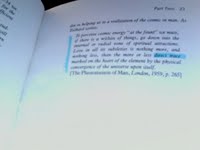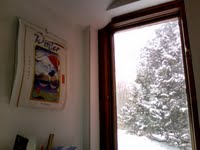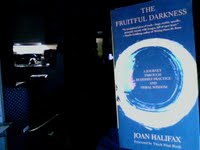Saturday, January 23, 2010
Friday, January 22, 2010
Is.
Only.
God is.
Bird tracks among towering snow clad peaks;If you wish to know God, know what God knows.
With the master's passing away,
Who will embody Ch'an?
Dust on the table has gathered
Since he entered Nirvana;
The color of the trees is different
From the time when he was alive.
The storied pagoda faces the wind
Blowing through the pines;
Traces of his presence linger
By the deserted spring. I sigh only for the tiger listening to sutras,
As time and again it comes by the side
Of the dilapidated hermitages.
- Chia Tao (779-843)
What does God know?
Know yourself.
God helps us.
Thursday, January 21, 2010
Count on nature to run its course.
What's white is cloud, and blue, mountain.
Carefree, she enjoys noble leisure.
The crane nesting in the pine tree,
In the world outside,
Is her only companion,
Oblivious to time passing.
--Daegak Euchon (1055-1101)
Unless, of course, you know something... I don't.
Wednesday, January 20, 2010
Tuesday, January 19, 2010
The Trappist monk was right: "Cheer up," he said, "things are only going to get worse." He wasn't being gloomy. Seeing absurdity he calls it absurdity.
It's time to go to the mattresses. Put on a pot for spaghetti. It might pass. If we wait long enough.
Everything is quiet, and the night is clear:The 360 degree spin out today in slick fresh snow doing 33mph ending slamming backwards into snowbank between two trees, not hitting either of them, then starting engine again, pulling out, driving home -- reminds me that not all accidents are accidents. Not a scrape on car nor myself. The snow continues to fall.
The perfect time to raise your pillow
And cultivate your mind.
The shadow of a cold lonely lamp
On the pine window,
And the sound of leaves falling
In the windy yard.
The forest stream flowing
Around the beams stirs
A noble taste
And the birds flitting
By the door are the friends
Of my calm heart.
After long wandering, I settled
At Hongryun Temple;
The splendor of the world
Weighs less than a grain of straw.
- Daegak Euchon (1055-1101)
The SongMaybe we are alone. It's not a problem. We seem to be frightened to be alone. The monastic wording is: To be alone with the Alone. The "Alone" doesn't want company -- rather, it is sufficient to be in the company of none other.
It still makes sense
to know the song after all.
My wiseness I wear
in despair of something better.
I am all beggar,
I am all ears.
Soon everything will be sold
and I can go back home
by myself again
and try to be a man.
(Poem by Robert Creeley)
Unity, someone said, not union.
It's a hard distinction for us. We hear it. Still...
It's like a song I can hear playing right in my earSure, we're one family. But we easily forget. And, sure, we're members of a community. but we still prefer to consider ourselves superior or better or more in the know. That we obscure our true nature and veil the longings of our hearts seems part of the price of admission to this desolate time.
That I can't sing
I can't help listening
(--from "For a Dancer," lyrics by Jackson Browne)
 And yet, and yet, and yet...
And yet, and yet, and yet...Keep a fire for the human raceI greet you there.
Let your prayers go drifting into space
You never know what will be coming down
Perhaps a better world is drawing near
And just as easily it could all disappear
Along with whatever meaning you might have found
Don't let the uncertainty turn you around
(the world keeps turning around and around)
Go on and make a joyful sound
(--Browne, ibid)
Even if the sound is silence.
Go on ahead, make it!
"Alone" is not what we think it is.
Monday, January 18, 2010
If you break openWhere is Martin now? If you say, "He's dead," or "He's still alive," you are right, but partially. If you say, "He is in heaven," you are again only partially right. If you suggest, "He's in the ground, nowhere else," you are still only half right.
The cherry tree,
There is not a single flower.
But the skies of spring
Bring forth the blossoms!
- Ikkyu (1394-1481)
In the photo on Huffington Post, Martin is linked-arms with Dr. Benjamin Spock on one of the marches, (Eunice Kennedy and Rosie Greer alongside). It occurs to me, in that Ben Spock used to attend silent sittings at our shop the year before his passing, that through his handshake and presence, Saskia and I have been "in touch" with Dr King.
Martin is hic et nunc, here and now: alive/dead, heaven/ground. He's where we least suspect.
In its physical reality there is only the total system; as far as its real operations and structure, all and each of the psychic notes are “of” the organic notes, and each one of the organic notes is a note “of” the psychic notes. Therefore, man does not “have” psyche and organism, but “is” psycho-organic, because neither organism nor psyche, each by itself, has any substantivity; only the system has it. Because of this I think we cannot talk about a psyche without an organism. Let us say in passing, that when Christianity for example, talks about surviving and immortality the one that survives and is immortal is not the soul, but man, that is, the whole human substantivity. Anything else is not of faith. Man is not psyche “and” organism, but rather his psyche is formally and constitutively “psyche-of” this organism, and this organism is formally and constitutively “organism-of” this psyche. The psyche is organic by itself and the organism is psychic by itself. This moment of the “of” is numerically “identical” in the psyche and the organism, furthermore it incorporates a “physical” characteristic. This numerical and physical identity of the “of” is what formally constitutes the systematic unity of human substantivity. It is a structural unity; structure is precisely and formally the unity of an “of” in its notes. Hence, human substantivity {108} is “one” by itself and from itself. The moments of this substantive system codetermine each other, but not as potency and act (as the Aristotelians might put it) of a hylomorphic substantial unity, but as realities in act and ex aequo whose codetermination consists in each being “of” all the rest. The “of” is a unity of the metaphysical type superior to the unity of potency and act. Moreover, in this “of” not only the radical unity of human substantivity consists, but also the very sameness during its entire life, a sameness that is entirely different from the numerical persistence of all the notes, something perfectly inexistent. Consequently, man is a psychorganic substantivity.The snow in Maine this morning is light and nearing 4-6 inches. I finish nailing off the wood ceiling on 2nd floor of bookshed. Rokie is relentlessly dropping tennis ball under chair in Wohnkuche. I'm growing adept at tossing it across kitchen up through louvered doors on far upper wall and through to upstairs hallway. It's a necessary skill to occupy the Border Collie. (Oops...I missed. Three for seven now! ... Four for fifteen -- just like my sandlot batting average -- 'adept' was, as usual, inaccurate.)
(MAN AND HIS BODY, by XAVIER ZUBIRI, From ESCRITOS MENORES (1953-1983), Alianza Editorial, Madrid, 2006, pp. 103-116, (Original article El hombre y su cuerpo, appeared in the journal Asclepio, No. 25, 1973, pp. 9-19), Translated by Joaquín A. Redondo, M.E., M.A. (Phil.) 2008)
The Edges Of TimeI climb Tom's ladder to dust blades of overhead fan. It stops wobbling.
It is at the edges
that time thins.
Time which had been
dense and viscous
as amber suspending
intentions like bees
unseizes them. A
humming begins,
apparently coming
from stacks of
put–off things or
just in back. A
racket of claims now,
as time flattens. A
glittering fan of things
competing to happen,
brilliant and urgent
as fish when seas
retreat.
(Poem, The Edges of Time, by Kay Ryan)
Sunday, January 17, 2010
No worldly dust in Chongmyung Temple,It's hard to forget the din of the world, even if some suggest doing so in the name of a disengaging spiritual purity pretending we are not living in this illusory madness called by many "the world." But here we live. I suspect our task is not to blink twice, tap our heels, and set off to a home free from the suffering and chaos of the world, landing in a heavon of transcendence and reward for our cleverness. While here, our task is to be here.
Among the clean mountains and streams.
A monk whose hair is turning grey
Lives there, forgetting the din of the world.
- Daegak Euchon (1055-1101)
“There are thefts everywhere,” said Joel Querette, 23, a college student camped out at a park near the airport. “People have guns and knives, and they are stealing and looting the stores.”Does he get beaten and burned to death because he was looting? Or, because some misguided impulse of vigilantly justice says he has transgressed the ethos of earthquake survival wherein you are guiltless until the police say you are bait for the desperation of traumatized frenzy?
As night fell, the police brought a man to Pétionville in the back of a pickup and informed a gathering crowd that he had been caught looting in another neighborhood, witnesses said. While the police officers stood by, an angry mob pulled the man from the truck.
The mob stripped the accused looter, then began beating him. They dragged him up the street while pummeling him, then threw him on a trash heap, where he lay vomiting and bleeding.
One man began piling trash on top of him and set it on fire. As the firelight flickered on an art gallery and a church on opposite sides of the street, dozens gathered to watch the man burn to death.
(--from, Looting Flares Where Authority Breaks Down, By SIMON ROMERO and MARC LACEY, Published: January 16, 2010, NY Times)
Trahison
Ce coeur obsédant, qui ne correspond
Pas à mon langage ou à mes costumes
Et sur lequel mordent, comme un crampon,
Des sentiments d’emprunt et des coutumes
D’Europe, sentez-vous cette souffrance
Et ce désespoir à nul autre égal
D’apprivoiser, avec des mots de France,
Ce coeur qui m’est venu du Sénégal?
—Léon Laleau
Betrayal
This unrelenting heart, whose rhythm suits
Neither my language nor my clothing
And into which bite, like jaws of a trap,
Borrowed sentiments and European
Customs—Do you feel this suffering
This despair unlike any other
Of domesticating, with words from France,
This heart that came to me from Senegal?
( Poem by Léon Laleau (1892-19??) who was a Haitian diplomat, intellectual and poet.)
And then:
Nouveau sermon nègre (extrait)
Ils ont craché sur Ta Face noire
Seigneur, notre ami, notre camarade
Toi qui écartas du visage de la prostituée
Comme un rideau de roseaux ses longs cheveux sur la source de ses larmes
Ils ont fait
les riches les pharisiens les propriétaires fonciers les banquiers
Ils ont fait de l’homme saignant le dieu sanglant
Oh Judas ricane
Oh Judas ricane:
Christ entre deux voleurs comme une flamme déchirée au sommet du monde
Allumait la révolte des esclaves
Mais Christ aujourd’hui est dans la maison des voleurs
Et ses bras déploient dans les cathédrales l’ombre étendue du vautour
Et dans les caves des monastères le prêtre compte les interêts des trente deniers
Et les clochers des églises crachent la mort sur les multitudes affamées
Nous ne leur pardonnerons pas, car ils savent ce qu’ils font
Ils ont lynché John qui organisait le syndicat
Ils l’ont chassé comme un loup hagard avec des chiens à travers bois
Ils l’ont pendu en riant au tronc du vieux sycomore
Non, frères, camarades
Nous ne prierons plus
Notre révolte s’élève comme le cri de l’oiseau de tempête au-dessus du clapotement pourri des marécages
Nous ne chanterons plus les tristes spirituals désespérés
Un autre chant jaillit de nos gorges
Nous déployons nos rouges drapeaux
Tachés du sang de nos justes
Sous ce signe nous marcherons
Sous ce signe nous marchons
Debout les damnés de la terre
Debout les forçats de la faim.
A New Black Sermon (excerpt)
They have spit on the blackness of Your Face,
Lord, our friend, our comrade,
You who parted the locks of the prostitute's face
Like a curtain of reeds covering the spring of her tears
They have made
the rich the pharisees the landowners the bankers
They have made of the bleeding man the bloodthirsty god
Oh, Judas, laugh,
Oh, Judas, laugh,
Christ between two thieves like a torn flame at the height of the world
Set fire to the slaves' revolt
But Christ is today in the house of the thieves
And his arms spread out like the vast wings of a vulture in the cathedrals
And the priest in the monastery's winecellar counts the interest on thirty pieces of silver
And the church steeples spit death onto the famished multitudes
We will not pardon them, for they know what they do
They have lynched John who organized the trade union
They hunted him with dogs like a weary wolf in the woods
Laughing they hung him from the old sycamore's trunk
No, brothers, comrades,
We will pray no more
Our revolt rises up like the cry of the storm bird over the lapping waters of the stinking swamps
We will no longer sing our despairing spirituals
A different song springs from our mouth
We will spread our red flags
Stained with the blood of our just
Under this banner we will march
Under this banner we are marching
Arise ye wretched of the earth
Arise ye prisoners of starvation
Jacques Roumain (1907-1944) was a Haitian intellectual and author. As a founder of the Haitian Communist Party, he was imprisoned early in his career for his political activities, then became active in the government after the end of the American occupation of Haiti
(--from, Oregon Literary Review, Vol. 2, No.1, Winter/Spring 2007)
The two small nations are linked by geography and destiny. They share the island of Hispaniola and have similar histories of tyrannical governments and foreign invasions.A televangelist fundamentalist preacher, Pat Robinson, has suggested the suffering and earthquake was a result of "a pact with the devil" made by Haiti to get free from France, the colonial power of the time. It could be the ramblings of demented belief.
Yet a gulf of historical resentment and prejudice divides them. Even today, Haiti's occupation of Santo Domingo during the 19th century is still a source of mistrust.
But after the apocalyptic devastation and death inflicted on Haiti by the quake, the historical mistrust has given way among many Dominicans - both on the island and in New York - to an overwhelming sense of pained solidarity.
"We are family; we are brothers and sisters. We live side by side," a middle-aged Dominican woman in Washington Heights told Univision, the Spanish language TV network. "We have to lend a hand, to help in any way we can."
...
Although Dominican President Leonel Fernández has offered aid to Haiti, his military has been sent to the border to halt desperate refugees from crossing.
(--from, Earthquake closes gulf between Haiti and Dominican Republic, ALBOR RUIZ - NY LOCAL, Sunday, January 17th 2010, 4:00 AM, NY Daily News, 17Jan2010)
The native leader Jean-Jacques Dessalines – long an ally and general of Toussaint l'Ouverture – defeated French troops led by Donatien-Marie-Joseph de Vimeur, vicomte de Rochambeau, at the Battle of Vertières. At the end of the double battle for emancipation and independence, former slaves proclaimed the independence of Saint-Domingue on 1 January 1804,[20] declaring the new nation be named Haïti, to honor one of the indigenous Taíno names for the island. Haiti is the only nation born of a slave revolt. [14] Historians have estimated the slave rebellion resulted in the death of 100,000 blacks and 24,000 of the 40,000 white colonists.We sometimes don't know what we are saying or doing nor why we say or do it.
(--from Wikipedia, Haiti)
I grieve this ignorance.
I grieve the man burned to death in a street between a church and an art gallery. And all who suffer the shaking earth.
Enter the heart.
The poet places it here:
Seeker of Truth
seeker of truth
follow no path
all paths lead where
truth is here
(Poem by E.E. Cummings)


